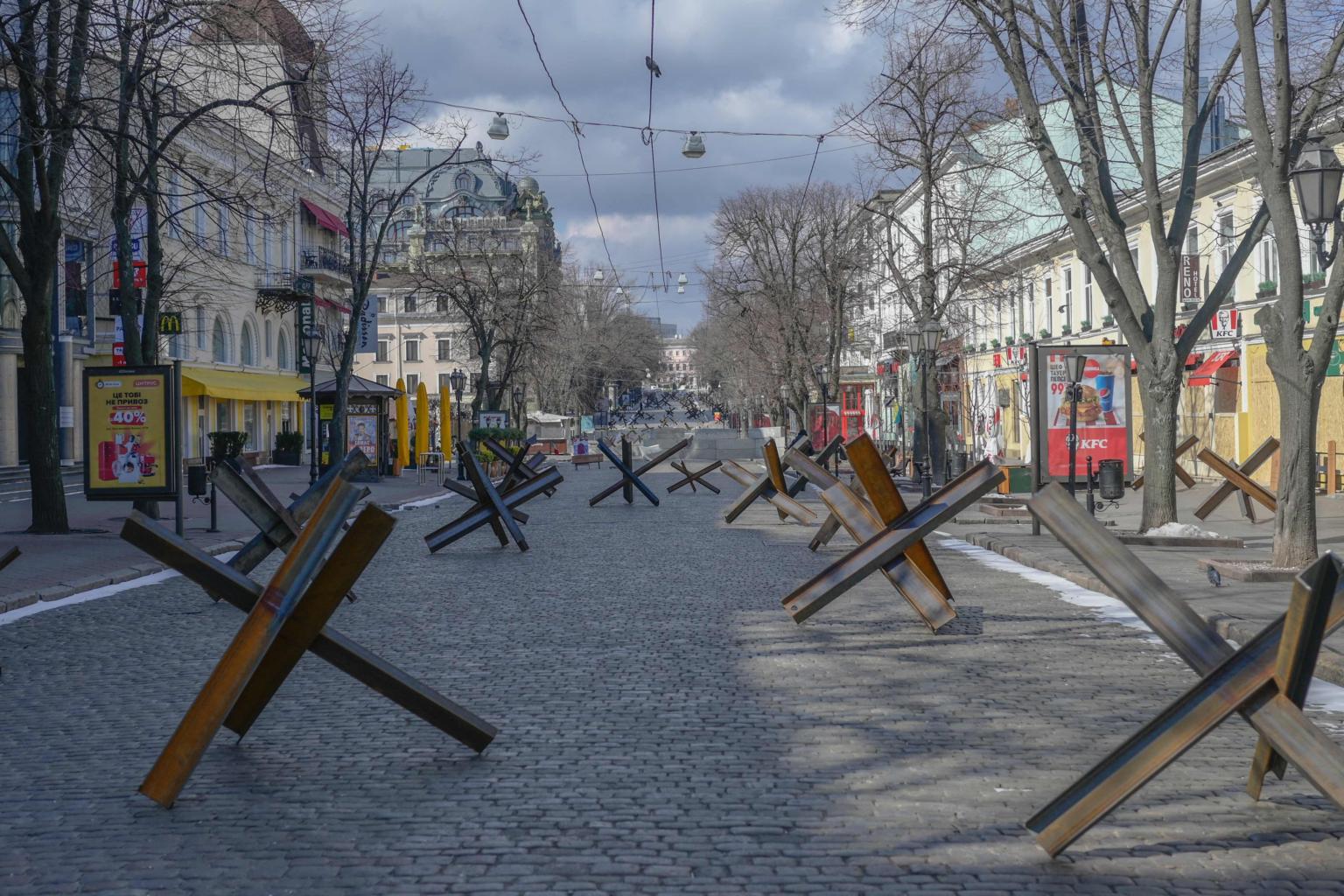For subscribers
Debate rages online over Singapore's stance against Russia's invasion of Ukraine
Sign up now: Get ST's newsletters delivered to your inbox

Anti-tank obstacles on a street in Odessa, Ukraine. The world is witnessing a crisis on a scale not seen since World War II.
PHOTO: AFP
Justin Ong
Follow topic:
SINGAPORE - The world is witnessing a crisis on a scale not seen in Europe since World War II, with estimates of thousands killed and millions turned into refugees.
And Mr Henry Tan feels sorry for the innocent civilian lives lost to the ongoing Russian invasion of Ukraine.
But the 48-year-old also sees it as a liberating act that will, in the long run, lead to better lives for the Ukrainian people.
He believes Moscow launched its Feb 24 attack to rescue ethnic Russians in Eastern Ukraine from a genocidal neo-Nazi militant regime, to clear up biological weapons labs endangering the lives of Ukrainians, to rescue children from one of the largest human trafficking networks in the region, and to ultimately free the country from corrupt Western influence.
These are allegations, conspiracy theories and ideologies that have been debunked and identified by Kyiv and the West as disinformation spread by Russia and allies such as China, to foment a pretext for an unjustified and illegal act of aggression ordered by President Vladimir Putin.
Mr Tan, who works in retail, shuns Western news outlets - he calls them “fake news media” where “reporting is always one-sided”.
He gets his information from social media platforms such as Telegram and YouTube instead.
Beliefs and views like his are also being circulated on Singapore social media platforms, and confidently upheld by some Singaporeans when pressed in interviews by The Straits Times.
While cognisant of Russian and Chinese propaganda forces that aim to seed such anti-West narratives, they argue the West is just as guilty of spreading anti-Russia and anti-China rhetoric.
Closer to home, they question Singapore’s condemnation and imposition of sanctions on Russia, considering it an unwise decision with possible negative repercussions - seeing as how the Republic has since been placed on a list of countries “unfriendly” to Moscow.
Observers say it would not be surprising if actors opposed to Singapore’s stance - the strongest by a South-east Asian country thus far - were attempting to undermine it and manipulate public opinion to create fissures in society.
Singapore’s sanctions - which target banks, electronics, computers and military items - were announced shortly after it joined 140 other members of the United Nations General Assembly in voting to denounce Russian aggression against Ukraine.
And Mr Henry Tan feels sorry for the innocent civilian lives lost to the ongoing Russian invasion of Ukraine.
But the 48-year-old also sees it as a liberating act that will, in the long run, lead to better lives for the Ukrainian people.
He believes Moscow launched its Feb 24 attack to rescue ethnic Russians in Eastern Ukraine from a genocidal neo-Nazi militant regime, to clear up biological weapons labs endangering the lives of Ukrainians, to rescue children from one of the largest human trafficking networks in the region, and to ultimately free the country from corrupt Western influence.
These are allegations, conspiracy theories and ideologies that have been debunked and identified by Kyiv and the West as disinformation spread by Russia and allies such as China, to foment a pretext for an unjustified and illegal act of aggression ordered by President Vladimir Putin.
Mr Tan, who works in retail, shuns Western news outlets - he calls them “fake news media” where “reporting is always one-sided”.
He gets his information from social media platforms such as Telegram and YouTube instead.
Beliefs and views like his are also being circulated on Singapore social media platforms, and confidently upheld by some Singaporeans when pressed in interviews by The Straits Times.
While cognisant of Russian and Chinese propaganda forces that aim to seed such anti-West narratives, they argue the West is just as guilty of spreading anti-Russia and anti-China rhetoric.
Closer to home, they question Singapore’s condemnation and imposition of sanctions on Russia, considering it an unwise decision with possible negative repercussions - seeing as how the Republic has since been placed on a list of countries “unfriendly” to Moscow.
Observers say it would not be surprising if actors opposed to Singapore’s stance - the strongest by a South-east Asian country thus far - were attempting to undermine it and manipulate public opinion to create fissures in society.
Singapore’s sanctions - which target banks, electronics, computers and military items - were announced shortly after it joined 140 other members of the United Nations General Assembly in voting to denounce Russian aggression against Ukraine.
But the solution, the observers add, should not be to only fall back on laws such as the Protection from Online Falsehoods and Manipulation Act.
They pointed instead to the need for credible information sources here.
They pointed instead to the need for credible information sources here.

